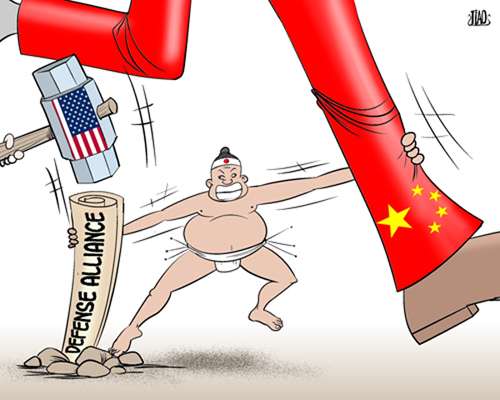The US is at fault on China-Japan historical issues
- By Jin Liangxiang
 0 Comment(s)
0 Comment(s) Print
Print E-mail China.org.cn, January 2, 2014
E-mail China.org.cn, January 2, 2014
Shinzo Abe's pilgrimage to Yasukuni Shrine on December 26 angered Japan's neighbors, especially China and South Korea. The rightward shift in Japanese politics is the primary cause of Abe's shameful behavior, but U.S. policy towards Japan, on historical issues in particular, must take some of the blame.
|
|
|
Stretched allegiances [By Jiao Haiyang/China.org.cn] |
It is true that the U.S. is not entirely uncritical of Japan's attitude. Shortly after Abe visited the shrine, the U.S. embassy in Japan issued a statement saying that the United States was disappointed that Japan's leadership had taken an action that would exacerbate tensions with its neighbors.
Furthermore, during a visit to Japan in October 2013, John Kerry and Chuck Hagel paid an unexpected visit to Chidorigafuchi, a cemetery containing the remains of unidentified Japanese soldiers who died in World War II. Unlike the nearby Yasukuni Shrine, Chidorigafuchi is considered neutral political ground. The clear purpose of Kerry and Hagel's visit was to send a signal to Japanese politicians that they should not stir up war-related anger in East Asia by visiting Yasukuni.
But was this enough? Absolutely not. Let us take a look at what the U.S. has done in other similar cases. The atrocities that the Nazis and Japanese militarists committed in the 1930s and 1940s were similar in scope and nature. Millions of Europeans, Jews in particular, were slaughtered by the Nazis, while the Japanese killed millions of Chinese and Koreans. Neither of these truths, which form the cornerstone of the post-war world order, should be denied. Any denial or dilution of the facts should be regarded as an offense against humanity, against justice, and a challenge to the postwar order.






